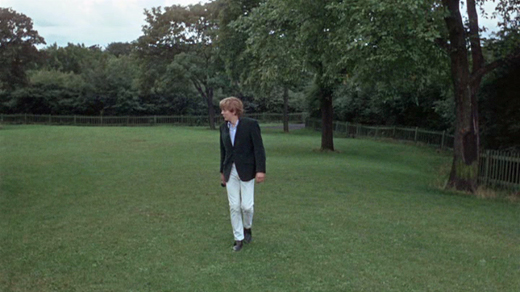
Clippings virumque cano.
What I want to know — but without lifting a finger to find out — is why I was so fascinated, way back in the Spring of 2001, with New Jersey’s Miranda Imbroglio. No, you’re right — I wouldn’t know what I was talking about, either, if I hadn’t unearthed a shoal of clippings about the matter this afternoon.
Let me take you back: Christie Whitman, then the Republican governor, resigned to take a cabinet position in the new Bush Administration (she wouldn’t last). This made Donald DiFrancesco, the President of the New Jersey State Senate, Acting Governor. The state constitution required that he remain president of the Senate. This meant that the powerful Mr DiFrancesco had a lot of enemies.
I can’t remember why Mr DiFrancesco wanted to appoint Isabel Miranda, a former Citibank executive, to serve as state treasurer. And I’m not going to try to find out now! David Halbfinger’s story in the Times (3-26-01) will have to do:
Isabel Miranda, who was named treasurer of New Jersey on March 19 and took over as acting treasurer on Friday, was director of trusts and estates for Citibank’s private banking unit until 1996, when, the co-workers say, she was forced to resign and immediately escorted from her office in the Citicorp tower in Midtown Manhattan.
The co-workers said Ms. Miranda was fired after auditors found evidence that she and Donald R. Browne Jr., an executive in Citibank’s San Francisco office who later transferred to New York, had charged the bank for frequent cross-country trips to visit each other and for trips together to places like Palm Beach, Fla.
There must have been a cherchez-la-femme aspect to this story that I found pungent at the time. But Ms Miranda’s misadventures have been buried by thick sediments of 9/11, James McGreevy, and Albany follies from Spitzer to Espada. (Here in the Tri-State area, we can deal with only one dysfunctional statehouse at a time.) The lights went out on this story in my brain a long time ago. I could remember, handling the clippings, that I’d been fascinated by it, but I hadn’t a clue as to why. Even now that I’ve glanced over Mr Halbfinger’s three-page story, I haven’t a clue as to why.
***
I still don’t know when exactly it was that I launched Portico, but I believe that it was during Y2K. So, when the DiFrancesco/Miranda story was in the news, my familiarity with Web publishing was still rudimentary. I mention this because I don’t think that it had occurred to me yet that a political story transpiring in New Jersey was something that I might ever write about. I was clipping the Times’s stories about it simply because they interested me, and I thought that, at some critical point in the future, it would be fun to haul out the old news and point to the details that, now, in this hypothetical future, would shimmer with iridescent significance. That critical moment never came. Other critical points supervened.
***
Getting rid of clippings has been on the agenda for a while now.  The deliberations have been complicated — if you don’t believe me, just remember “Times Select” — but the salient point here is that I don’t need the reminders that newspaper clippings can provide. I know this because they never provided me with any reminders, and that for the simple reason that I never consulted them. Once tucked away in their folders, the clippings entered the state of suspended existence experienced by all those knick-knacks on the Titanic. Unlike said knick-knacks, the clippings lacked any and all intrinsic interest.
There was one extrinsic interest that they might have developed, however, and this dire possibility made it imperative to get rid of the things. I’ve neglected to mention until right now that the two well-stuffed accordion folders that I finished purging this afternoon contained clippings from the Summer of 2o00 to the Summer of — 2002. I was certainly at the height of my newspaper-clipping powers back in those critical years! But just think: what if I became famous (posthumously, of course), and scholars discovered those accordion files? You know what scholars are! The Clippings of RJ Keefe: 2000-2002. Once they’d dealt with my choice of 9/11/Terrorism articles, and my phonebook-thick sheaf of plush about The Producers (all tossed today, except for the one with the Hirschfeld drawing. Hirschfeld!), they’d speculate about my “unaccountable interest in New Jersey politics.” Couldn’t have that!
***
I did find one clipping that shimmered with iridescent significance. It was so shimmeringly significant that I almost broke down in tears. Among the many Paul Krugman columns that I cut out of the Times before finally realizing that (a) I agreed with Mr Krugman on all points and (b) it would more convenient to collect his thoughts in book form, even though (c) this turned out to be unnecessary, given the whizbang Times site, which nobody could have imagined back then, was the following, “Passing The Buck” (3 September 2002).
In his keynote speech at last week’s Jackson Hole conference, Mr. Greenspan offered two excuses. First, he claimed that it wasn’t absolutely clear, even during the manic market run-up of 1999, that something was amiss: “it was very difficult to definitively identify a bubble until after the fact — that is, when its bursting confirmed its existence.” Second, he claimed that the Fed couldn’t have done anything anyway. “Is there some policy that can at least limit the size of a bubble and, hence, its destructive fallout? . . . the answer appears to be no.”
I wasn’t alone in finding this speech disturbingly evasive. As The Financial Times noted, policy makers always have to act on limited information: “The burden of proof for a central bank should not be absolute certainty.” The editorial also reminded readers that while Mr. Greenspan may now portray himself as skeptical but powerless during the bubble years, at the time many saw him as a cheerleader. “The Fed chairman . . . may well have contributed to the explosion of exuberance in the late 1990’s with his increasingly bullish observations.”
Moreover, there is evidence that Mr. Greenspan actually knew better. In September 1996, at a meeting of the Federal Open Market Committee, he told his colleagues, “I recognize that there is a stock market bubble problem at this point.” And he had a solution: “We do have the possibility of . . . increasing margin requirements. I guarantee that if you want to get rid of the bubble, whatever it is, that will do it.”
Yet he never did increase margin requirements, that is, require investors to put up more cash when buying stocks.
You’ll note that Mr Krugman (and, presumably, the Financial Times) uses the C word: cheerleader. If only Alan Greenspan’s tenure at the Federal Reserve could be as murkily lost to the mists of time as the machinations of Donald DiFrancesco, what a much happier world this would be! I have no doubt of it. I had no doubt of it when I clipped Mr Krugman’s column.
























